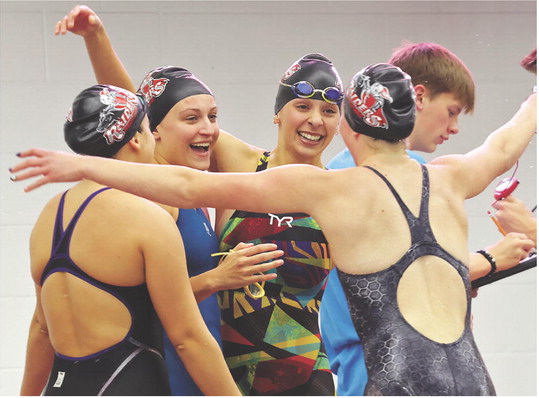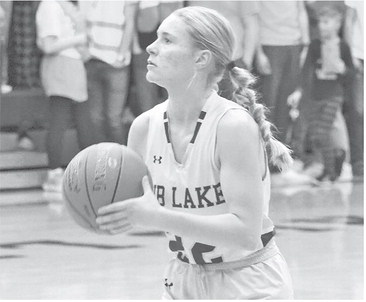Don’t have to be a Bulls fan to get caught up in ‘Last Dance’


With few options available to keep sports fans entertained during the great coronavirus shutdown of 2020, “The Last Dance,” the 10-part documentary on the 1997-98 Chicago Bulls airing each Sunday nights on ESPN has been like a desert oasis the last three weeks.
For two hours, it quenches the need to watch something new and captivating. When 10 p.m. hits and the show’s over, it’s back to the vast nothingness.
Through six episodes, the documentary has featured some amazing behindthe- scenes footage, not only from the 1997-98 season, but several years before that. Of course, most of that footage centers on Michael Jordan. The shows have featured a refreshing honesty from the individuals involved inside the Bulls organization and from opposing teams who were trying to knock them off during their run of six world championships in eight years.
One wonders what was going through the minds of the NBA Entertainment camera crew who was given all of that access during that 1997-98 season as they were getting it all on film. They saw and heard some amazing stuff as the egos of professional sports, the drive within championship-level performances, the business of professional sports and the future decisions that are made when money talks in professional sports all came to a head and prematurely broke up a dynasty.
I say this as a guy who never liked the Chicago Bulls. I grew to despise them really. If you know me, I’m all about my home-state teams and the Bulls were a nearby, Central Division rival to the Milwaukee Bucks. The Bucks, however, were an NBA doormat in the 1990s that, quite honestly, often weren’t worth watching after a successful but championship- less run in the 1980s.
That illustrates why sports oftentimes need dynasties. There are the millions who join the bandwagon and drive the business train that way. Lord knows, the Chicago Bulls were the world’s most famous team in the day. Then there are the other millions who buy tickets and drive up TV ratings because they want to see that team get beat.
Either way, people watched. And they’re reliving it now each Sunday night.
That’s really been the trigger for me to watch. I just get a kick out of trying to remember if I watched a certain game live, and where I was and who I was with when it happened. Were the details as I remembered them? Other viewers may see things differently, but I’m reminded that as dominant as Jordan and the Bulls were, if just a few shots at the end of a few NBA playoff games go the other way, we’re not talking about three-peats and dynasties.
But those shots did go the way they did and Jordan, Scottie Pippen and head coach Phil Jackson won six rings. Absolutely tremendous players of the time –– Patrick Ewing, Charles Barkley, John Stockton, Karl Malone, Shawn Kemp, Reggie Miller –– got none.
When it comes to Pippen, I had forgotten how underpaid he was at the end of his time in Chicago and had missed much of that 97-98 season due to an injury and, to some extent, pouting. He deserved better. I had kinda forgotten how the whole break-up actually started with general manager Jerry Krause deciding for Jackson that his time as the coach was up. That, of course, led to Jordan retiring for a second time and the break-up of the band, so to speak. Let’s face it. At the end, the Bulls consisted of three really great ones in Jordan, Pippen and Jackson. Dennis Rodman was great at what he did, defend and rebound. The rest of them were role players, mostly veterans who just did their jobs well enough to earn Jordan’s respect.
More than 20 years later, it’s still mind-boggling that the organization wouldn’t let the key figures involved try to make history as long as they could. Why wouldn’t Pippen have gotten a raise, especially in the period between 1993-95 when Jordan had retired the first time? Why wouldn’t you at least try to entice Jackson to go year-by-year until the run ended. Why did management seemingly not believe Jordan when he said he’d retire if Jackson was let go?
As a Bulls hater, I recall not minding that the dynasty fell apart, but I would’ve preferred to see someone truly knock them off their throne on the court.
The documentary has reminded viewers of Jordan’s greatness and this past Sunday’s episodes provided quite the insight into how tough it had become to be him by the end of Chicago’s first threepeat in 1993 with never-ending media scrutiny and fans and cameras swarming him any time he was out in public.
But talk about being the ultimate game-changer when he came into the league. You didn’t have to be a Bulls fan to like Jordan in his younger days. Hey, I had a pair of Air Jordans too in the mid-1980s. The league had its mega-stars with Larry Bird and Magic Johnson, among others, but Jordan was just different. He wasn’t the technician Bird was or wear the fun-loving smile that Johnson did. He competed, got to the rim at will and dunked with a ferocity that had been unseen, yet he could hit a finesse, clutch jumper whenever his team needed it. He defended like crazy too. Every all-pro athlete hates to lose, but his hate level was just higher than anyone else’s.
That competitiveness hurt him at times on the golf course and at the blackjack table, but he obviously could afford losing some bets. Like most of the greats, he found any slight he could and made it personal.
Today’s younger fans were treated to great ones in Kobe Bryant and LeBron James. I’d still take Jordan in his prime in a game that my team 100% absolutely had to win.
And I’ll gladly take four more hours of this documentary, even if I have to see video of those darn Bulls winning it all again.
Matt Frey is the Sports Editor at The Star News.
Matt’s
Bleacher Shots
Matt Frey





